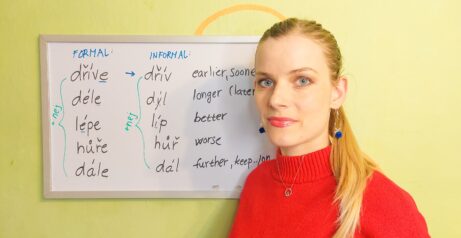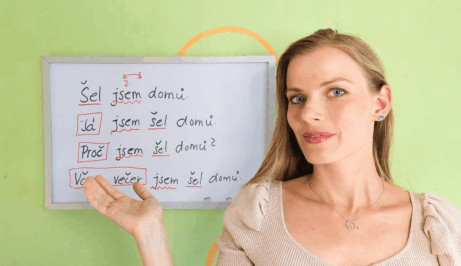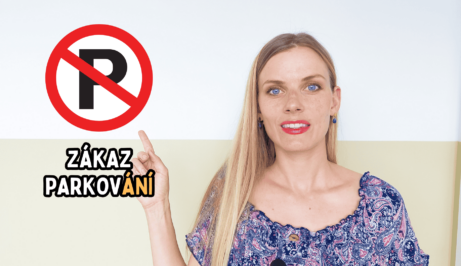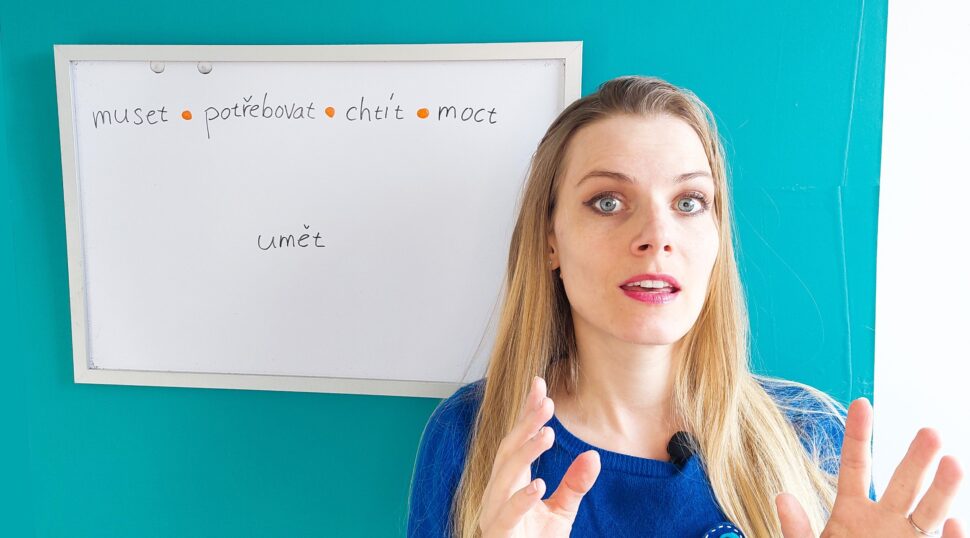
Umím česky. Chci domů. When can we leave out main verbs in Czech?
You might have heard a Czech person say: Umím anglicky (I can speak English) or Neumím anglicky (I can’t speak English). Did they forget to add the verb ‘to speak’ (mluvit)? Let’s see what is going on.
Watch a video about this topic here:
First things first
Let’s review the basics. We can leave out the main verb in sentences that contain modal verbs. Modal verbs express possibility, ability, permission, or necessity and usually cannot be used by themselves; they are commonly followed by a main verb.
These are the modal verbs (I also included potřebovat, which is not exactly a modal verb but it has a lot in common with this group):
| muset | potřebovat | chtít | moct | umět |
| must | need | want | can | know how |
| (já) Musím | Potřebuju | Chci | Můžu | Umím |
Using these verbs by themselves doesn’t make sense because we are missing more information. We usually use a verb in the infinitive form (its base form), for example:
muset:
potřebovat:
chtít:
moct:
umět:
Musím se zeptat.
Potřebuju se zeptat.
Chci se zeptat.
Můžu se zeptat.
Umím se zeptat.
(I must ask.)
(I need to ask.)
(I want to ask.)
(I can ask.)
(I know how to ask.)
Use Internet Language Reference Book to look up other forms of these verbs.
If we use a motion verb instead (jít, jet, chodit…), we often need to specify the destination (where is it we want to go = KAM?)

Musím jít domů.
Potřebuju jít domů.
Chci jít domů.
Můžu jít domů.
(I must go home.)
(I need to go home.)
(I want to go home.)
(I can go home.)
(Let’s not use umím in this context.)
Now, the interesting part:
In spoken Czech, it is common to leave out the main verb with constructions like these:
- Musím
jítdomů. Musím domů means the same thing: I must go home. - Potřebuju
jítdomů. - Chci
jítdomů. - Můžu
jítdomů.
Using sentences such as Chci domů is correct and because of the adverbial phrase of place in the phrase (a destination) it’s clear that the speaker wants to get to the destination. Besides, that destination is more important than the means of getting there (walking, flying…).
modal verb + (main verb) + destination
Let’s see another example:
Chci do Ameriky. I want to go to America. (It’s not important how I will get there.)
jet – to go in a vehicle
letět – to fly
cestovat – to travel to
se dostat – to get to
Chci jet do Ameriky.
Chci letět do Ameriky.
Chci cestovat do Ameriky.
Chci se dostat do Ameriky.
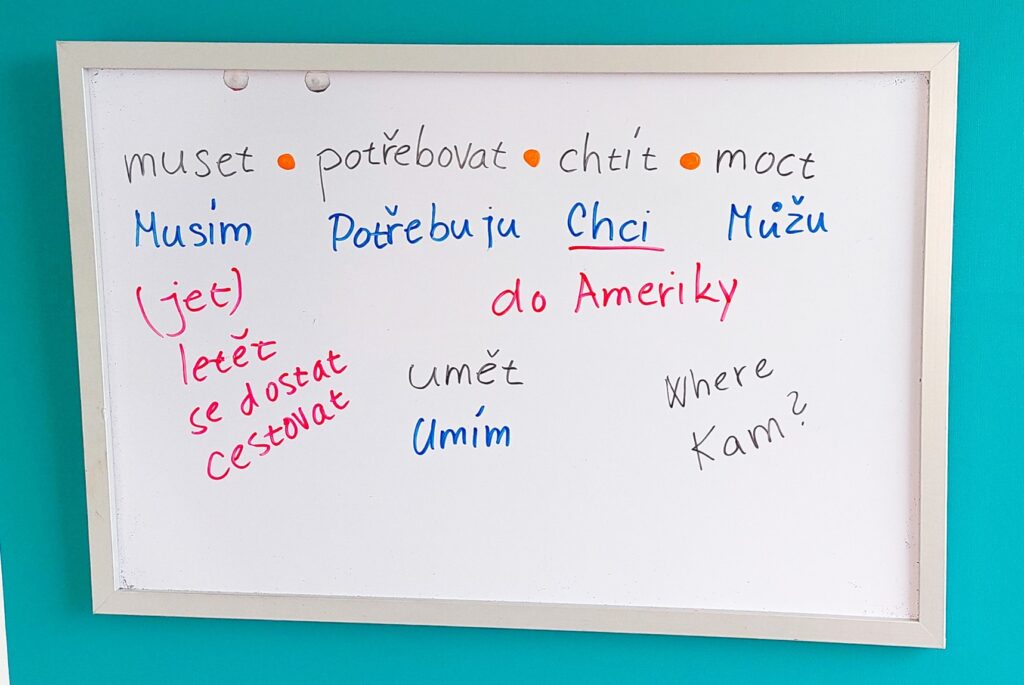
More common phrases:
Chci ven.
Ještě nechci do práce.
Musím pryč.
Musím k doktorovi.
Musíme na poštu.
Musím pro brambory.
Můžu do pokoje?
Můžu k tobě na chvilku?
Potřebuju na záchod.
I want (to go) out.
I don’t want to go to work yet.
I have to go/leave.
I have to go to the doctor.
We have to go to the post office.
I have to (go) get potatoes.
Can I go to the room?
Can I come to you (stop by) for a moment?
I need to go to the bathroom. (informal)
Notice some words are marked in red. Those parts of sentences express the destination and we can ask about this piece of information with the question where, kam?
Kam chceš? → Chci ven.
Leaving out the main verb doesn’t concern only the phrases with modal verbs in present tense, the same can happen in the future, past or the conditional phrase:
Future:
Budu chtít ven.
Nebudu chtít do práce.
Budu muset k doktorovi.
Budeme muset na poštu.
Budu moct do pokoje?
Budu moct k tobě na chvilku?
Past:
Chtěl(a) jsem ven.
Nechtěl(a) jsem do práce.
Musel(a) jsem k doktorovi.
Museli jsme na poštu.
Mohl(a) jsem do pokoje?
Mohl(a) jsem k tobě na chvilku?
Conditional:
Chtěl(a) bych ven.
Nechtěl(a) bych do práce.
Musel(a) bych k doktorovi.
Museli bychom na poštu.
Mohl(a) bych do pokoje?
Mohl(a) bych k tobě na chvilku?
What about umět?
Umět expresses a skill so it doesn’t make sense to emphasize the destination. We can leave out the main verb if it is clear from the context what skill we refer to:
Umíš mluvit anglicky? (Can you speak English?)
Umíš anglicky?
Neumím tancovat tango. (I don’t know how to dance the tango.)
Neumím tango.
Umím uvařit svíčkovou. (I know how to cook ‘svíčková’.)
Umím svíčkovou.

Exercises
a) Say these sentences in informal Czech (without the main verb):
e.g. Chceš jít ven? → Chceš ven?
1. Potřebujeme jít na nákup. →
2. Ještě nechci jít pryč. →
3. Mohli bychom letět do Prahy. →
4. Já tuhle písničku neumím zpívat. →
5. Kočka už chce jít zase domů. →
6. Musela jsem se stavit za babičkou. →
7. Myslím, že budu muset zajít do kanceláře. →
8. Promiň, musím běžet na vlak! →
b) Put the words in the correct order to make sentences:
1. do můžeš koupelny už
2. k měsíc zubaři musíš k příští
3. na oběd mnou chceš se ?
4. počítačem umíš tímhle s ?
5. na budeme potřebovat trh

Solutions
a)
1. Potřebujeme na nákup.
2. Ještě nechci pryč.
3. Mohli bychom do Prahy.
4. Já tuhle písničku neumím.
5. Kočka už chce zase domů.
6. Musela jsem za babičkou.
7. Myslím, že budu muset do kanceláře.
8. Promiň, musím na vlak!
- We need to go shopping.
- I don’t want to leave yet.
- We could go to Prague.
- I can’t sing this song (I don’t know it).
- The cat wants to come home again.
- I had to visit my grandmother.
- I think I’ll have to go to the office.
- Sorry, I have to catch the train!
b)
1. Už můžeš do koupelny. / Můžeš už do koupelny.
2. Příští měsíc musíš k zubaři.
3. Chceš se mnou na oběd?
4. Umíš s tímhle počítačem?
5. Budeme potřebovat na trh.
You can go to the bathroom now.
You have to go to the dentist next month.
Do you want to join (come with) me for lunch?
Do you know how to use this computer?
We will need to go to the market.

